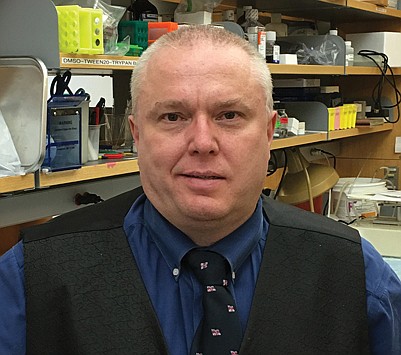VCU researcher asks: Could AR-12 help combat COVID-19?
Jeremy M. Lazarus | 4/2/2020, 6 p.m.
Dr. Paul Dent is frustrated that a virus-killing compound he spent years investigating is not being used as a treatment in the current coronavirus pandemic.
The Virginia Commonwealth University researcher is watching people dying from coronavirus in hospitals in Richmond and across the country. But he can’t find anyone interested in testing the medication that appears to have the potential to save those who are suffering from the infection that invades the lungs.
Despite well-documented research in his VCU lab and other places showing that the compound called AR-12 can kill every kind of virus, including the SARS-style coronavirus, no clinical trials have been authorized or conducted on extremely ill patients in a last-ditch effort to save them.
Dr. Dent said that he and VCU cancer specialist Dr. Andrew Poklepovic recommended AR-12 in responding to a recent request from the National Institutes of Health for treatment ideas for coronavirus, but has not heard anything back.
The Centers for Disease Control and Prevention also has not made inquiries about AR-12, although the research on AR-12 has been available for years and is well known in the medical research community.
Officials from the CDC and NIH, and Dr. M. Norman Oliver, Virginia’s state health commissioner, have not responded to queries from the Free Press concerning AR-12 and human trials.
Dr. Dent devoted more than 11 years to investigating AR-12 and has published several papers showing how AR-12 works to destroy viruses. He is concerned that the research is being ignored at a time when he sees AR-12 as essential to preventing needless deaths.
He said he and Dr. Poklepovic are trying to reach out to contacts to see if someone might consider beginning the clinical testing process.
The first step would be to secure access to a BioSafety Level 3 lab, Dr. Dent said. “We have one at VCU, but it only works on bacteria. So we are looking elsewhere.”
AR-12 was first discovered at Ohio State University. A researcher there, Dr. Ching-Shih Chen, came up with it in looking for a new cancer treatment. AR-12 is derived from the popular arthritis remedy Celebrex.
Dr. Dent, who runs an innovative cancer research lab at VCU and is widely recognized for his work, was intrigued by the discovery and was curious about the mechanism that made the drug effective after the initial explanation Dr. Chen proposed was ruled out in further testing.
Starting in 2005, Dr. Dent and his team at VCU began the work that determined how AR-12 worked. That work continued through 2016. At the time, the Zika virus was rampant, but Dr. Dent was unable to spur interest in clinical trials at the time.
According to Dr. Dent, AR-12 attacks the “chaperone” proteins that enable every type of virus to reproduce and take over normal cells. With AR-12 inhibiting the chaperones, the virus cannot form its correct shape, becomes dysfunctional and dies, he said.
In a study published in 2016 in the Journal of Cell Physiology, Dr. Dent reported on the effectiveness of AR-12 against a wide range of viruses, including drug-resistant strains of HIV, Ebola, flu, mumps and measles, based on lab research and animal studies. He also has documented its effectiveness against bacteria.
Similar research at labs inArizona, Maryland,Argentina,Australia and Spain have confirmed the findings, published research shows. So has the U.S. Army’s medical research arm, which has reported positive findings on its 2017 tests of AR-12 as a treatment for Ebola and drug-resistant strains of MRSA and E.coli bacteria.
So far, no public or private interests have sought to undertake any other clinical work with AR-12.
VCU Health officials also have not commented.








